Introduction
What might it mean for us to collectively dream and commit to knowing and caring for each other across our differences, understanding that the world we want to live in tomorrow is dependent on the action we take together today? Audre Lorde insists that dreams are not a luxury but the “fountain of power” in which the future of our worlds can grow. “It is our dreams that point the way to freedom,” she writes. Under the weight of the COVID-19 pandemic, systemic violence against Black people, Indigenous people and people of colour, and climate emergencies, and alongside the fatigue and bruising caused by academic institutions, we seek to weave daydreams out of daymares.
The practice of collective dreaming arises through the mutual support we experience living through our various daymares. By establishing a collective, we are hoping to nurture insurgent communities – even as they may intentionally come together in contingent and temporal realities – for wider collective daydreaming that fosters fountains of power and freedom for structurally-subjugated communities. In particular, we reclaim space, time and energy from systemic daymares to daydream an Insurgent/Resurgent Knowledges (IRK) Lab into reality as a generative, virtual research hub designed for scholars to incubate practices that foster communities and knowledge-production amongmarginalised groups.
To continue reading, download Breaking Daymares, Weaving Daydreams here
Crisis as Structure, Not Event
On March 11, 2020, WHO Director-General, Tedros Adhanom Ghebreyesus “[rang] the alarm bell loud and clear.” In declaring COVID-19 a pandemic, he iterated that this was “not just a public health crisis,” but a crisis “that will touch every sector.” In this, “every sector and every individual must be involved in the fight,” and we must “all look out for each other, because we need each other.” Since this declaration, the oppressive foundations upon which the pandemic unfolds have become clear — COVID-19 is not “the great equalizer.”
The imperatives of being there for each other have weighed disproportionately on Indigenous, Black, and people of color communities (IBPOC). The rhetoric of being “all in this together” quickly dissipated during the resurgence of white nationalist populism. Anti-Asian racism is rising, coupled with increasing surveillance of marginalized communities and state-sanctioned brutality toward Black and Indigenous peoples. The proliferation of carceral language is ubiquitous with media using terms like “lockdown,” “solitary,” and “confinement” to typify public health responses.





